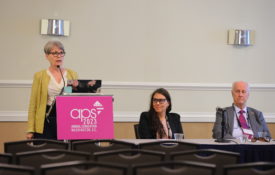-

Repeated Exposure to News Headlines Makes Behavior Seem Less Unethical
From frequent smartphone notifications to repetitious TV news programs, we often experience repeated exposure to various news headlines as we go about our daily lives. When the news provides stories of wrongdoing, that repeated exposure may influence our own sense of morality, making those narratives seem more true and less unethical.
-

Carl Hart on Clinicians’ Bias Toward Drug Use
Podcast featuring Carl Hart, a neuroscientist at Columbia University who has studied the behavioral and neuropharmacological effects of psychoactive drugs in humans. His lab attempts to understand factors that mediate drug use, to develop effective treatments, and to translate that knowledge into more humane drug policies.
-

Bringing Contexts In, Taking Racism Out: How to Improve Cognitive Psychology
Podcast: How can researchers reshape cognitive psychology to become more aware of the roles of culture and context? Ayanna Thomas joins APS’s Ludmila Nunes to discuss scientific racism in cognitive psychology.
-

Founders, Funders, Teams: Exploring the Psychology of Entrepreneurship
To discuss the value of research at the intersection of psychological science and entrepreneurship, three speakers presented their different career paths and experiences within entrepreneurship in a symposium at the 2023 APS Annual Convention in Washington, D.C.
-

Endless Love: You’ve Got Ideas About Consensual Nonmonogamy. They’re Probably Wrong
Podcast: In this episode of Under the Cortex, Amy C. Moors joins APS’s Ludmila Nunes and demystifies common misconceptions about consensually nonmonogamous relationships.
-

Psychology’s Role in the Criminalization of Blackness
Podcast: Evan Auguste and Steven Kasparek examine how psychology has contributed to anti-Blackness within psychological research, criminal justice, and mental health, and what scientists and practitioners can do to interrupt the criminalization of Blackness and redefine psychology’s relationship with justice.

